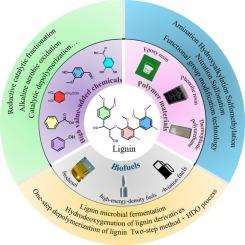木质素在增值化学品、生物燃料和聚合材料方面的最新进展、挑战和机遇
IF 9.9
1区 工程技术
Q1 ENERGY & FUELS
引用次数: 0
摘要
木质素是一种丰富的可再生资源,对可再生能源和可持续发展的重要性与日俱增。最近,人们开始关注利用木质素生产增值化学品、生物燃料和聚合物材料。本综述讨论了通过催化解聚产生增值化学品的工艺,详细介绍了相关方法、机制和催化剂。它还涵盖了通过脱氢、脱甲基和微生物发酵将解聚产物转化为香兰素、苯酚、苯甲酸和脂肪酸等化合物的过程。在生物燃料生产方面,综述系统地研究了将木质素转化为生物柴油和航空燃料等运输燃料的技术,以及通过加氢脱氧转化为高能量密度燃料的技术。此外,综述还讨论了木质素基聚合物材料,包括环氧树脂和热塑性聚氨酯,强调了与石油基替代品相比可提高其性能的官能团改性技术。综述指出了当前的技术障碍和新兴研究方向,以提高木质素转化为高附加值产品的效率,从而推动其工业应用。本文章由计算机程序翻译,如有差异,请以英文原文为准。

Recent advances, challenges, and opportunities in lignin valorization for value-Added chemicals, biofuels, and polymeric materials
Lignin, an abundant and renewable resource, is increasingly important for renewable energy and sustainable development. Recent attention has focused on producing value-added chemicals, biofuels, and polymeric materials from lignin. This review discusses the processes for generating value-added chemicals via catalytic depolymerization, detailing the methods, mechanisms, and catalysts involved. It also covers the conversion of depolymerization products into compounds like vanillin, phenol, benzoic acid, and fatty acids through dehydrogenation, demethylation, and microbial fermentation. In biofuel production, the review systematically examines techniques for transforming lignin into transportation fuels, such as biodiesel and aviation fuel, as well as high-energy–density fuels through hydrodeoxygenation. Additionally, it addresses lignin-based polymeric materials, including epoxy resins and thermoplastic polyurethanes, emphasizing functional group modification techniques that enhance their properties compared to petroleum-based alternatives. The review identifies current technological barriers and emerging research directions to improve the efficient conversion of lignin into value-added products, aiming to advance its industrial applications.
求助全文
通过发布文献求助,成功后即可免费获取论文全文。
去求助
来源期刊

Energy Conversion and Management
工程技术-力学
CiteScore
19.00
自引率
11.50%
发文量
1304
审稿时长
17 days
期刊介绍:
The journal Energy Conversion and Management provides a forum for publishing original contributions and comprehensive technical review articles of interdisciplinary and original research on all important energy topics.
The topics considered include energy generation, utilization, conversion, storage, transmission, conservation, management and sustainability. These topics typically involve various types of energy such as mechanical, thermal, nuclear, chemical, electromagnetic, magnetic and electric. These energy types cover all known energy resources, including renewable resources (e.g., solar, bio, hydro, wind, geothermal and ocean energy), fossil fuels and nuclear resources.
 求助内容:
求助内容: 应助结果提醒方式:
应助结果提醒方式:


